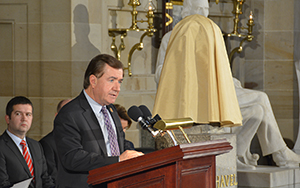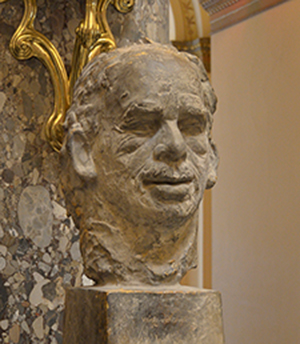Chairman Royce Honors Václav Havel in U.S. Capitol Ceremony
Václav Havel bust to be on display in Freedom Foyer
Washington, D.C. – Today, U.S. Rep. Ed Royce (R-CA), Chairman of the House Foreign Affairs Committee, joined other Congressional leaders to dedicate a bust of Václav Havel, former President of the Czech Republic and lifelong democracy activist, in a bipartisan ceremony in the U.S. Capitol.
Chairman Royce is the author of H. Res. 506, legislation that provides authorization for the display of the bust in the U.S. Capitol’s Freedom Foyer and honors the life and legacy of Václav Havel. The legislation unanimously passed the House of Representatives earlier this year.

(Foreign Affairs Committee Chairman Ed Royce speaks prior to unveiling of Václav Havel bust)

(Bust of Václav Havel on display in U.S. Capitol)
Below are Chairman Royce’s remarks, as prepared for delivery:
It is an honor indeed to pay tribute to one of the most influential political leaders in recent history.
Vaclav Havel committed his life to promoting individual liberty and human rights.
He used his talent and wit to pen insightful critiques of the communist system that undermined the dictatorship’s legitimacy.
The political truths that Havel’s’ speeches and written works revealed inspired his generation to oppose the corrupt communist system and led to its peaceful collapse twenty-five years ago.
Following the Velvet Revolution, in 1989 he continued to lead his people as the first democratically elected President of the Czech Republic in over forty years.
During his term, he also oversaw the peaceful separation of the Czech and Slovak Republics, and guided his country’s entrance into the European Union and the North Atlantic Treaty Organization.
He knew that Eastern Europe’s march towards democracy was not complete with the fall of the Soviet Union and he invited Radio Free Europe-Radio Liberty to establish its new home in Prague. As a man of letters, he especially understood the power and importance of the free flow of information. I am sure that today Havel would be deeply concerned by the Russian propaganda machine that threatens freedom and his region.
Even in his later years, Havel remained a passionate advocate for freedom, especially for those living under the authoritarian regimes of Iran, Cuba, Belarus and Burma.
His clarity of thought and commitment to democratic values are as relevant today as they were 25 years ago, as new generations find their democratic ideals being threatened by extremist rhetoric and violence, or covert actions or outright military aggression by neighboring states.
It is my hope that the placement of Havel’s image next to Winston Churchill in the Capitol will serve as such an inspiration for future generations to support peaceful activism and advance freedom and democracy.
###